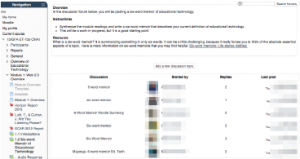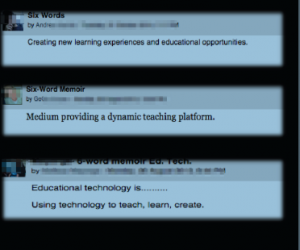Tags: Assessment, Content, Digital Storytelling, Interaction, Memoir, Mobile, Reflection, Six-Word Memoir, Synthesis, Text Message
Description
Similar to the six-word story from the flash fiction genre, the Six-Word Memoir is a writing genre for telling a personal story in six-words. In popular culture, it has become a global movement now featured in the book Not Quite What I Was Planning: Six-Word Memoirs: by Writers Famous and Obscure, on [in the US] National Public Radio, and in The New Yorker. The idea was presented by Smith Magazine as a challenge, “Can you tell your life story in six words?” For example, “cursed with cancer, blessed with friends.”
Repurposing the six-word memoir format as an academic exercise has unlimited possibilities using mobile devices and the affordances of texting and social media. In online/blended courses, the six-word memoir may be implemented using a variety of repositories such as an LMS, a blog, social media space, etc. However, texting using a group app such as Cel.ly or the Google texting app allows students to create and consume on a mobile device using their chosen preference for communication, texting.
Communication through mobile technology continues to grow. In the U.S., 96% of American adults own a smartphone (Pew Internet and American Life Project, 2019, June) demonstrating the continual growth of mobile devices for communication and information consumption. The mobile phone is the device of choice for teens who use texting as the centerpiece of their communication (Lenhart, Ling, Campbell, & Purcell, 2010). Texting has been criticized for creating poor writing habits and creating distracted learners. Many faculty have a mental image of students who are together but talking to others, or even to people they are with, via texting.

However, texting offers experience in casual writing in ways that weren’t available 20 years ago (Thompson, 2013). Linguistic experts liken texting as writing practice in ways similar to that of children learning how to speak. Levy (2014) credits linguist John McWhorter from his Ted Talk in which he posits texting as a positive move back to a more oral form of communicating. Some of the other benefits he posits from texting are the creation of a new lingo that emerges within the existing grammatical structure and is good bilingual practice for the brain.
Link to example artifact(s)
In Dr. Scott Hamm’s (Hardin-Simmons University) online Digital Media course, the six-word memoir is used as an initial knowledge assessment in which the students describe their biggest need or concern about the upcoming course. They are instructed to include this in their initial post to the introduction forum. This allows a sense of shared understand about the needs and concerns that are present among the cohort. After all the initial posts are made, students then text another six-word memoir that is a compilation of all the memoirs. This serves to connect everyone on the texting app and starts of great conversations and initiates community.
Another use of the six-word memoir within Dr. Hamm’s course is used mid-semester to assess student understand of terms. A six-word definition of “Educational Technology” is assigned to be sent out via the course texting app to the class. View the assignment: Six-word Memoir of Educational Technology. Dr. Hamm has used this to gain a corporate understanding of one term and has used it to allow the students to each select one definition and write a six-word memoir to share with the class.

Either approach requires everyone in the course to reflect upon and concisely offer their own definition. Further, they read everyone else’s memoir and can immediately respond by text. Using texting apps to host this assignment allows online/blended students to participate in reflection and sharing in real time without logging into the LMS.
There are a variety of applications for using the six-word memoir in a blended or online course. It can be hosted within the LMS, but the six-words, convenience of mobile devices, and texting preferences make this an ideal learning activity for mobile devices.
Link to scholarly reference(s)
Lenhart, A., Ling, R., Campbell, S., & Purcell, K. ( April 20, 2010). Teen and mobile phones. Pew Research Center: Internet, Science & Tech. http://www.pewinternet.org/2010/04/20/teens-and-mobile-phones/
Levy, L. (Dec. 2, 2015). Seven ways to use texting to your advantage in the classroom. Edudemic: Connecting education and technology. https://www.wabisabilearning.com/blog/7-ways-can-use-texting-advantage-classroom
Pew Internet and Life Project (June 12, 2019). Demographics of mobile use. http://www.pewinternet.org/fact-sheet/mobile/
Thompson, C. (Sept. 13, 2013). The dumbest generation? No, Twitter is making kids smarter. Globe and Mail. http://www.theglobeandmail.com/life/how-new-digital-tools-are-making-kids-smarter/article14321886/?page=all
Citation
Hamm, S. (2015). Assign six word memoirs for reflection and synthesis. In B. Chen & K. Thompson (Eds.), Teaching Online Pedagogical Repository. Orlando, FL: University of Central Florida Center for Distributed Learning. https://topr.online.ucf.edu/assign-six-word-memoirs-for-reflection-and-synthesis/.Post Revisions:
- July 24, 2020 @ 19:07:43 [Current Revision]
- July 24, 2020 @ 19:07:43
- August 2, 2019 @ 18:33:23
- May 23, 2017 @ 20:18:29

